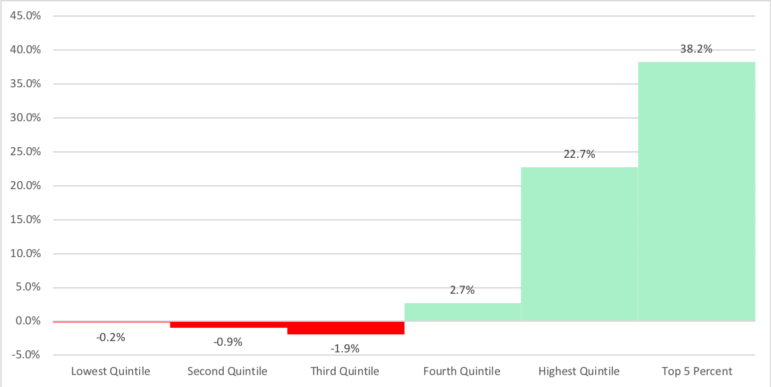The big picture: Michigan’s core economic challenges

Let’s start the new year with the big picture. An overview of the structural economic challenges Michigan faces if we are to have an economy that as it grows benefits all. Redefining economic success. First is understanding that even though Michigan has a historically low unemployment rate and corporate Michigan is doing well (as are […]
Finland: capitalism and shared prosperity

In a must-read New York Times article entitled Finland is a Capitalist Paradise, Anu Partanen and Trevor Corson describe a path for America to become a place with a capitalism that results in shared prosperity. Finland has rejected the notion that you have to choose one or the other. As described by Partanen and Corson […]
Michigan falling behind on wages and benefits

When its comes to wages and benefits Michigan used to be among the top states. No more. The state has fallen from 8th in 1990 to 21st in 2018. Michigan has gone from $3,743 above the nation on average compensation to $4,416 below in inflation adjusted dollars. The table at the end of this post […]
25-34 year old African Americans B.A. earnings premium

In a previous post we explored the huge B.A. earnings premium for 25-34 year olds. In this post I want to explore how well 25-34 year old African Americans with a four-year degree or more do in the labor market compared to other African Americans with lower education attainment and compared to whites. The data […]
We support, but are disappointed in, charter schools

Reading Richard Whitmire’s worth reading The B.A. Breakthrough reminded me why Michigan Future has been supportive of charter schools from their inception in Michigan more than a quarter of century ago. Largely because they provide an alternative to chronically failing big city school district’s schools. Whitmire chronicles how the best of the national charter networks […]
Updated B.A. earnings premium for 25-34 year olds

2018 work earnings data are now available from the Current Population Survey. What follows is an update of an earlier post now with 2018 data. The story we are told over and over again is for today’s students getting a four-year degree is no longer a good value for many. It may have been for […]
A capitalist calls for a new capitalism

Salesforce chairman and co-C.E.O Marc Benioff in a New York Times op ed entitled We Need a New Capitalism becomes another capitalist advocating for big changes in American capitalism. He writes: To my fellow business leaders and billionaires, I say that we can no longer wash our hands of our responsibility or what people do […]
Cities and universities drive economic growth

Crain’s Chad Livengood begins his story on the new University of Michigan Detroit Center for Innovation this way: Across the Potomac River from the nation’s capital, Virginia Tech is developing a 1 million-square-foot innovation campus in Alexandria, Va., that’s two Metro commuter train stops away from the second North American headquarters Amazon is building. In […]
Governor Whitmer focuses on reducing ALICE

Governor Whitmer framed her announcements of expanding access to food assistance, cash assistance and State Emergency Relief and to increase the number of workers eligible for overtime pay in terms of helping Michigan’s ALICE households. This is exactly the approach to economic policy that Michigan most needs now. One that is focused on raising household […]
The nature of work today and tomorrow

I recently gave a speech at the Michigan Works Annual Conference on the future of work. It explores how the nature of work is likely to change largely because of automation. You can read the speech here. The speech does not predict a looming apocalypse. With not enough jobs for those who want and need […]
